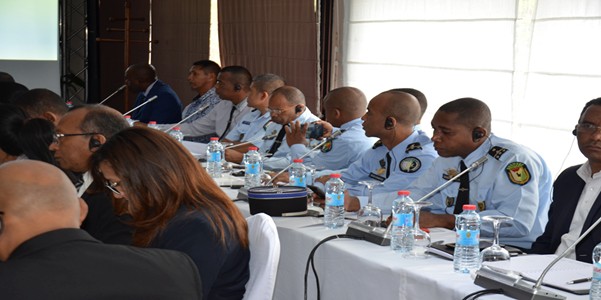
Antananarivo, Friday, March 6, 2020: COMESA Maritime Security (MASE) programme has trained 54 law enforcement personnel to strengthen the country’s and the regional capacity to fight money laundering and terrorism financing. They include magistrates, prosecutors, police/gendarmerie, officials from financial intelligence unit, anti-corruption commission, central intelligence services, among others.
The latest capacity building event was a two-day workshop that took place on 4th and 5th March 2020 in Antananarivo, in response to a request from Madagascar authorities. The Director General of Madagascar Financial Intelligence Unit (FIU- SAMIFIN), Mr Boto Tsara Dia Lamina opened the workshop.
At the same time, a Numeric Platform that was developed by the COMESA MASE programme was handed over to Mr Lamina for use by stakeholders in the country.
Mr. Lamina thanked COMESA for the support, which he said will facilitate information sharing thus reinforcing the efforts to crack down on transnational organized crimes such as money laundering and other related illicit financial flows crime.
COMESA has also supported Madagascar to attain full membership of the Eastern and Southern Africa Anti-Money Laundering Group (ESAAMLG).
During the workshop, participants were taken through various investigative techniques including surveillance, undercover operations, wiretapping and accessing computer systems.
The COMESA Component of the MASE programme, has the overall objectives of strengthening the capacity against money laundering and the financing of terrorism. It is customized to fit the specific needs of the respective countries in view that the countries are at different stages of the development of their Anti-Money Laundering (AML) regimes.
MASE Coordinator for COMESA, Ms. Dalitso Bonongwe encouraged the Law Enforcement Agencies (LEAs) to work together and put in place formal means of cooperation, such as Memoranda of Understanding over and above the informal settings, with Financial Intelligence Units.
“In the fight against money laundering, the interventions of LEAs need to be effective in order to deter criminals from perpetrating such crimes,” she said adding that ineffective interventions can provide a conducive environment for prospective criminals.
“As LEAs, think beyond the traditional offenses of money laundering and illicit financial flows and start to follow the dirty money and recover all the associated “dirty” assets,” Ms Bonongwe said.
Respective countries are expected to work with COMESA to identify the specific AML capacity building needs that can be supported by the Programme.
The task of law enforcement agencies in the fight against money laundering includes investigations, prosecutions and asset recovery. LEAs are tasked to use the intelligence from FIUs to bring criminals to book. Hence, if LEAs lack the expertise to investigate and prosecute the criminals, then all invested efforts by other stakeholders will be in vain.
COMESA is one of four regional bodies implementing the EU funded Regional Maritime Security Programme, each of which is implementing a component based on its comparative advantage. The others are the Inter-Governmental Authority on Development (IGAD); the Indian Ocean Community (IOC) and the East African Community (EAC).

